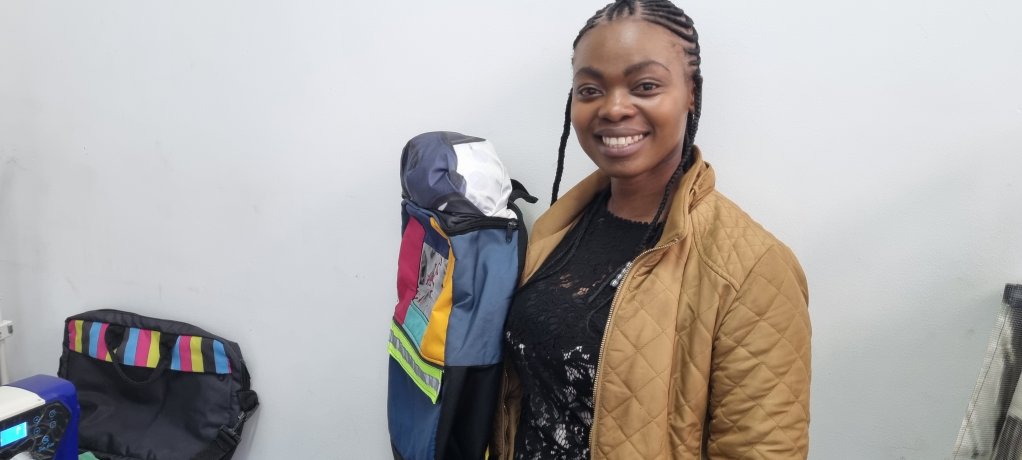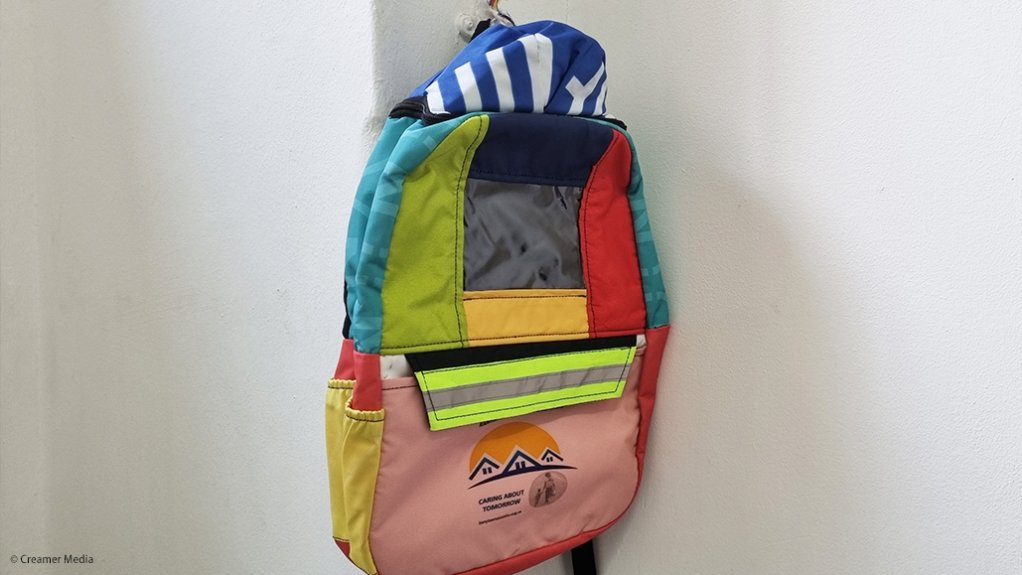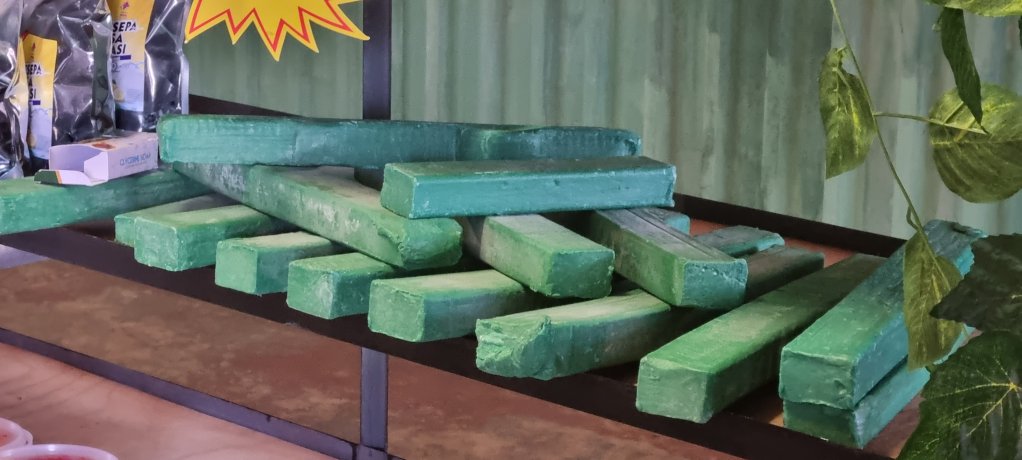Nedbank showcases two organisations making sustainable upcycling impact in Gauteng




Kanyisa Mawethu Foundation owner Kanyisa Mancunga with an upcycled school bag
Photo by Creamer Media's Marleny Arnoldi
Kanyisa Mawethu school bag
Photo by Creamer Media's Marleny Arnoldi
Mighty House of Soap multipurpose soap bar
Photo by Creamer Media's Marleny Arnoldi
Financial services provider Nedbank says two organisations it supports in the green economy through Indalo Inclusive South Africa have managed to empower and employ young people and scale up their recycling and upcycling operations.
The first organisation, the Kanyisa Mawethu Foundation, in Johannesburg, has, through the assistance of a R90 000 grant, managed to rent a space, acquire five sewing machines and tables, and train and permanently employ three people.
Another five people are employed part-time when owner Kanyisa Mancunga receives a big order.
The organisation manufactures school bags from collected canvas waste featuring a raincoat, reflective strips and a solar light, to help children who would have otherwise likely not been able to attend school.
Kanyisa also manufactures shopping, gift, laptop and lunch bags for retail and corporate gifting purposes.
The organisation collects canvas and other waste material from companies discarding banners, billboards and other branding items in various parts of Gauteng, to manufacture bags that are equally, if not more, durable than retail school bags.
Kanyisa sells the school bags, which it can manufacture at a rate of 15 bags a day, to other companies and organisations at R520 apiece, for them to distribute the bags into communities with struggling scholars.
In addition to its environmental benefits, the school bags Kanyisa distributes provide big corporations with the opportunity to sponsor change in the lives of rural communities, and have their logo embroidered on the side.
Mancunga explains that children from rural townships often walk in the dark and in rainy conditions, which ruins school books and makes their journey unsafe, hence the need for a raincoat and solar light to be attached to the backpack.
She adds that the solar light can charge while children walk in daylight hours and throughout the day at school, for use on their journey back home or at home when studying. The bag itself is also durable to carry books, compared with the alternative these children often use – plastic shopping bags.
The organisation in 2022 won the Indalogrow Enterprise Award, which is hosted by Indalo and powered by Nedbank.
Kanyisa also works with property develop Hyprop’s Foundation to have school bags made and distributed.
Mancunga strives to expand the business through more corporate partnerships, as well as to manufacture solar lights.
Another Indalo awards winner for innovation, Tlotlokgolo Investments, in Ga-Rankuwa, north of Pretoria, has since 2017 been manufacturing bars of soap and other cleaning products from used cooking oil.
Owner Thuso Motao and her team, through the Mighty House of Soap brand, collects used cooking oil from local fast food shops and supermarkets to produce a green multipurpose bar soap, which is, in turn, sold to small supermarkets, households and food outlets.
Through her day-to-day operations, which include snail farming for the use of mucus in cosmetic products, she promotes awareness on disposing of used oil in a sustainable way and how it can be made into cleaning products.
Motao provides financial incentives to households that recycle their used oil through a buyback system.
Her organisation is not only helping to employ young people, but is also helping to reduce blockages of drains in the City of Tshwane caused by the incorrect disposal of used oil into drain systems.
Since receiving an initial grant of R50 000, as well as an extended grant of R45 000 later on, from Nedbank through Indalo, Motao has managed to turn more than R800 000 in revenue from 2021 to June this year, and permanently employs nine people.
Motao has collected more than 70 t of used cooking oil since starting her production of soap bars in 2017. Responding to how her business started, she explains she is a self-taught scientist, with no formal education in chemistry or science. Her business started with soapmaking experiments at home with used cooking oil.
The process has grown to involve oil collection, checking and purification, as well as manufacturing of biological cleaning products.
Motao is expanding her business by manufacturing biological cleaning and cosmetic products, instead of selling synthetic products. She believes biological products hold much lower environmental and human safety risks over the long term.
Her range of products in the Mighty House of Soap include floor polish, hand sanitiser, fabric softener, window cleaner, hand wash, car wash liquid, bleach, floor cleaner, dishwashing liquid, multipurpose soap bars, bath salts, glycerine bars and aqueous cream.
Motao says oil is an underrated monster of an environmental problem, which she hopes more people will realise across the country.
She is aiming to expand her business further through the installation of oil analysing technology that can determine the percentages of palm and canola oil, for example, that is present in a sample.
Motao is eager to install hot soap curing machines, which will cut curing time down to two days, as opposed to the cold curing process that takes 14 days.
Motao is also reaching out to the tourism sector of Pretoria to not only collect their used cooking oil, but to supply her sustainable cleaning products into hotels and other facilities.
Meanwhile, Nedbank continues its corporate social initiative efforts through the Nedbank Foundation’s Green Economy Strategy, which addresses not only waste challenges in South Africa using the circular economy approach, but also assists energy, water and agricultural development.
Article Enquiry
Email Article
Save Article
Feedback
To advertise email advertising@creamermedia.co.za or click here
Announcements
What's On
Subscribe to improve your user experience...
Option 1 (equivalent of R125 a month):
Receive a weekly copy of Creamer Media's Engineering News & Mining Weekly magazine
(print copy for those in South Africa and e-magazine for those outside of South Africa)
Receive daily email newsletters
Access to full search results
Access archive of magazine back copies
Access to Projects in Progress
Access to ONE Research Report of your choice in PDF format
Option 2 (equivalent of R375 a month):
All benefits from Option 1
PLUS
Access to Creamer Media's Research Channel Africa for ALL Research Reports, in PDF format, on various industrial and mining sectors
including Electricity; Water; Energy Transition; Hydrogen; Roads, Rail and Ports; Coal; Gold; Platinum; Battery Metals; etc.
Already a subscriber?
Forgotten your password?
Receive weekly copy of Creamer Media's Engineering News & Mining Weekly magazine (print copy for those in South Africa and e-magazine for those outside of South Africa)
➕
Recieve daily email newsletters
➕
Access to full search results
➕
Access archive of magazine back copies
➕
Access to Projects in Progress
➕
Access to ONE Research Report of your choice in PDF format
RESEARCH CHANNEL AFRICA
R4500 (equivalent of R375 a month)
SUBSCRIBEAll benefits from Option 1
➕
Access to Creamer Media's Research Channel Africa for ALL Research Reports on various industrial and mining sectors, in PDF format, including on:
Electricity
➕
Water
➕
Energy Transition
➕
Hydrogen
➕
Roads, Rail and Ports
➕
Coal
➕
Gold
➕
Platinum
➕
Battery Metals
➕
etc.
Receive all benefits from Option 1 or Option 2 delivered to numerous people at your company
➕
Multiple User names and Passwords for simultaneous log-ins
➕
Intranet integration access to all in your organisation




















